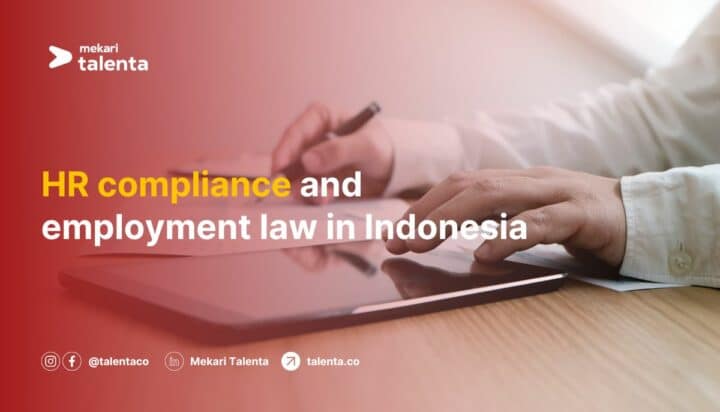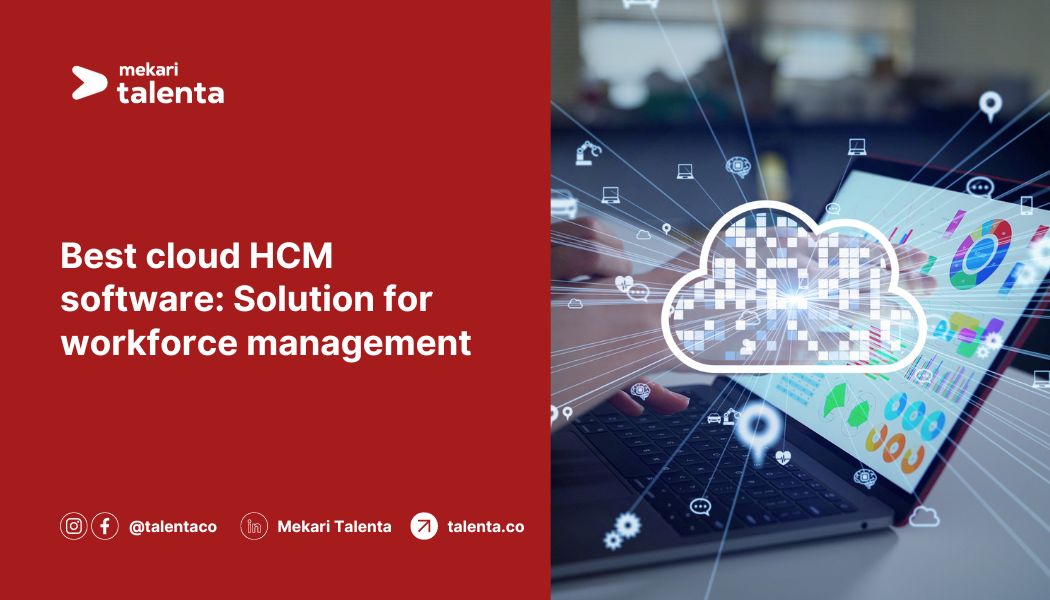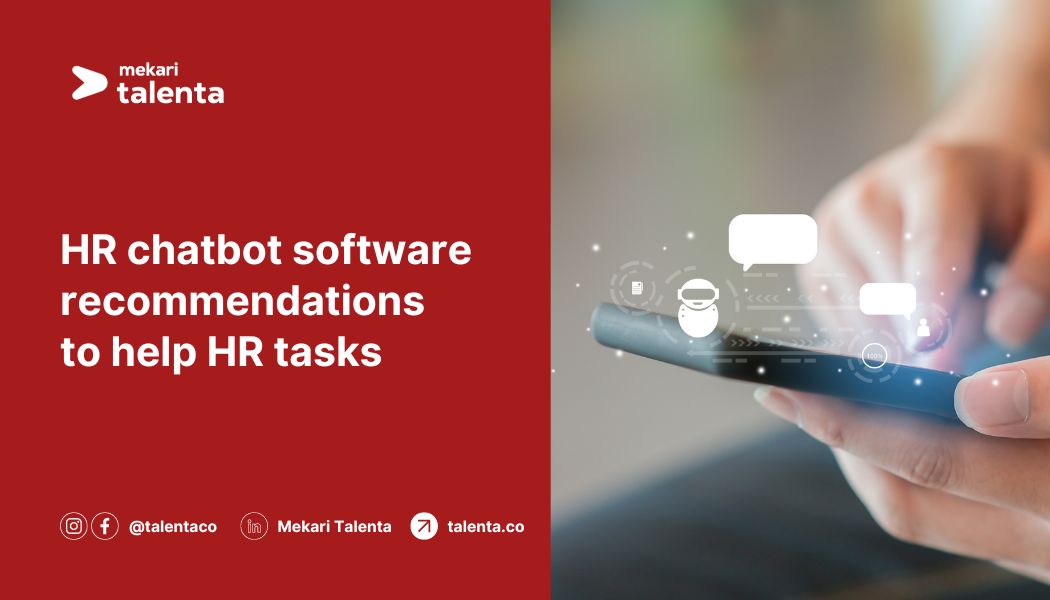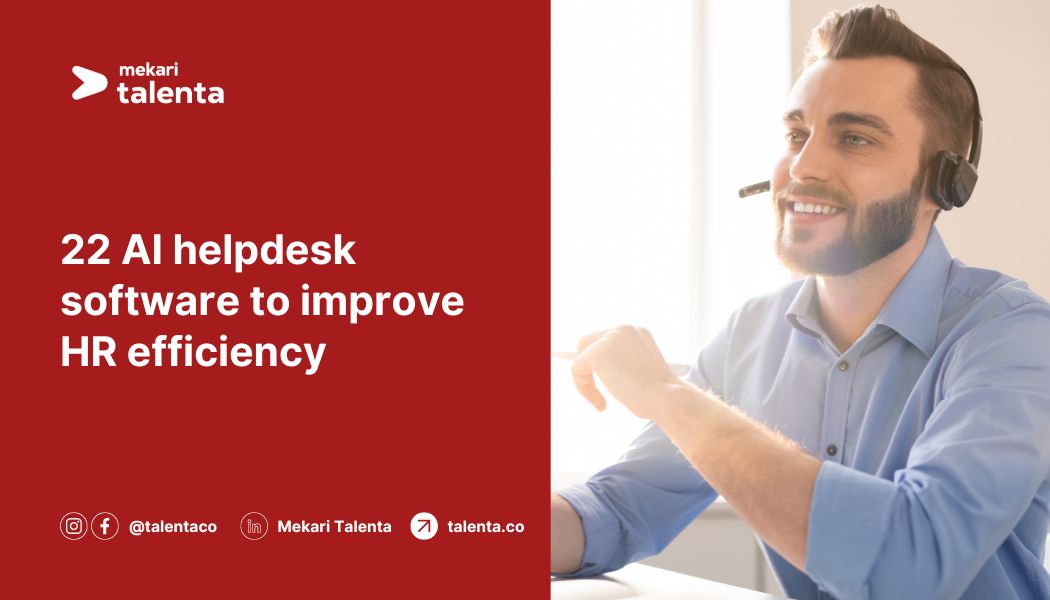No matter how big or small the company is, HR compliance is a very important role. They are responsible for making sure that a company complies with employment law in Indonesia
They will also make sure that employees have a proper education regarding any issues about compliance in the company.
HR compliance also ensures a safety and fair working environment for all employees.
What is HR compliance
HR compliance by essence is a role to ensure that company policies and actions comply with employment laws in the country, in this case Indonesia.
Their job involves creating and also documenting rules and regulations within the company then implementing them to ensure that they are aligned with the laws and regulations.
Compliance must be carried out by every company and business owner. Failed to do that and companies might be subject to multiple sanctions, ranging from fines, imprisonment, destruction to the brand or company image, to revocation of business licenses.
Employment law in Indonesia
In general, there are 3 main sources of employment law in Indonesia, which are:
- Labor Law of 2003 on Manpower as recently amended by Law No. 11 of 2020 on Job Creation and recently revoked by Government Regulation in Lieu of Law No. 2 of 2022 on Job Creation
- Law No. 21 of 2000 on Labor Union
- Law No. 2 of 2004 on Industrial Relations Dispute Settlement.
These laws and regulations are important because they become a key for companies to create a guide on how to deal with employment, including information about hiring employees, types of contracts, employee leave, work hours, overtime, employment termination, and so on.
Not only that, they also play a vital role in ensuring that employment practices within companies remain fair and lawful.
Like mentioned above, companies of any size have to follow these laws and regulations to avoid fines, legal issues, and also bad image.
In short, some examples of employees rights that have to be fulfilled are:
- Receiving minimum wage based on each province
- Receiving social security, which includes pension, healthcare, life insurance, accident insurance, and old-age benefits
- Receiving religious holiday bonus (1 time for each year)
- Receiving a minimum leave of 12 days
- Receiving statutory absence or payment when the employee does not take annual leave
- Receiving payment for overtime
- Making sure it’s the right type of contract for each employee
- And so on.
HR compliance common issues in accordance with employment law in Indonesia
In Indonesia, HR compliance can be influenced by the country’s specific labor laws, cultural norms, and regulatory environment.
Here are some common HR compliance issues that organizations often face in Indonesia.
Employment laws and regulations
Indonesia has complex employment laws and regulations that cover various aspects of employment, including minimum wage, working hours, overtime, leave entitlements, termination procedures, and more.
Ensuring compliance with these laws can be challenging, especially for organizations with diverse workforces and operations in multiple regions.
Therefore in retrospect, every policy and rules that applied in the company has to comply with the newest labor law, which is Law No. 2 of 2022 on Job Creation (UU Cipta Kerja).
Contract and classification issues
Determining whether a worker should be classified as an employee or an independent contractor can be difficult.
Misclassification can lead to disputes over benefits, rights, and legal liabilities.
According to Law No. 2 of 2022 on Job Creation, the maximum contract length for an employee with Employee Agreement for a Specific Period (Perjanjian Kerja Waktu Tertentu or PKWT) is 5 years.
This is a revised version of Labor Law of 2003 on Manpower where the maximum contract length for a contract based employee is 2 years.
Employers should comply with this rule which means that after an employment contract has reached 5 years and they still want to keep the employee to continue working, they have to make them a permanent employee (Perjanjian Kerja Waktu Tidak Tertentu or PKWTT).
Foreign worker regulations
Hiring and managing foreign workers requires adherence to specific regulations, including obtaining appropriate work permits and visas.
Failure to comply with these regulations can result in penalties and legal complications.
For example, if a company wants to hire a foreign worker, they have to prepare a Foreign Worker Utilization Plan (Rencana Penggunaan Tenaga Kerja Asing or RPTKA).
Foreign Worker Utilization Plan is a document that mentions the specific job description and also length of employment of foreign employees that will work in Indonesia.
This document will be checked by the Ministry of Manpower so that they can grant working visas and stay permits.
As a responsibility, employers should apply the document that can be done through a website under the Ministry of Manpower.
The document application should be addressed to the Director of Foreign Manpower Utilization Management (Direktur Pengendalian Penggunaan Tenaga Kerja Asing).
Termination procedures
Indonesian labor laws are protective of employees’ rights, and terminating an employee can be a complex process.
Employers must provide valid reasons for termination and follow proper procedures to avoid legal challenges.
After termination, employers have to give severance pay that has already been regulated under Article 156 paragraph (1) Job Creation Law No. 2 of 2022.
The amount of severance pay depends on how long the employee has worked at the company.
Failing to do that, employers who do not pay workers’ severance pay are subject to criminal sanctions of 4 (four) years in prison.
Minimum wage compliance
Each region in Indonesia sets its own minimum wage levels. Employers must ensure that they are paying employees at least the minimum wage for their respective regions.
Minimum wage of each region was regulated in Government Regulations No. 36 of 2021 on Wages (PP Nomor 36 Tahun 2021 tentang Pengupahan) which is the derived rule from Job Creation Law of 2022.
But even though the government has already decided the minimum wage for every region, there are still some companies that failed to comply with it and give their employees a salary under the minimum wage.
According to Article 185 of the Job Creation Law, employers who pay workers wages below the minimum wage are subject to imprisonment for a minimum of 1 year and a maximum of 4 years and/or a fine of a minimum of Rp100,000,000 and a maximum of Rp400,000,000.
Overtime and working hours
Adhering to rules regarding working hours, rest periods, and overtime is important to prevent violations and disputes related to fair compensation and work-life balance.
Overtime in Indonesia is regulated under Article 78 Job Creation Law No. 2 of 2022 stipulates a maximum of 4 hours of overtime in 1 day.
Employers should know that it’s their responsibility to give compensation for overtime employees and neglecting that aspect seems quite common in Indonesia.
Unpaid overtime is a serious violation of workers’ rights and the rules set by law in Indonesia. Workers have the right to receive fair compensation for the overtime they perform, in accordance with the provisions regulated by law.
The company can be subject to administrative sanctions in the form of written warning and restrictions on business activities.
Leave entitlements
Indonesia has various types of leave entitlements, including annual leave, sick leave, maternity leave, and religious holidays. Ensuring proper administration and adherence to these entitlements is crucial.
Article 79 Job Creation Law No. 2 of 2022 stated that annual leave is given to employees for at least 12 working days after the employee has worked for one year.
In addition, there is also a long break of at least 2 months and it is carried out in the seventh and eighth years, 1 month each for workers who have worked for 6 years.
Employers need to keep in mind that annual leave is an employee’s right. So it is not the company’s right to refuse employee leave if they apply for it.
Workplace safety
Complying with workplace safety and health regulations, as stipulated by the Ministry of Manpower and Transmigration, is essential to maintain a safe work environment and prevent accidents.
Every company needs to create a safe and healthy work environment so that employees can work comfortably and feel safe.
Social security and benefits
Employers are required to contribute to the country’s social security programs, including the national health insurance and pension systems like BPJS Kesehatan dan BPJS Ketenagakerjaan.
Ensuring proper deductions and contributions are made is important for compliance.
According to Indonesia’s Law No. 40 of 2004 on the National Social Security System, it is said that social security is a form of social protection to ensure that all people can fulfill their basic needs for a decent life.
Religious and cultural considerations
Indonesia is culturally diverse, and religious considerations can play a significant role in employment practices.
Accommodating religious practices and holidays is important to maintain a respectful and inclusive workplace.
Navigating these HR compliance issues in Indonesia requires a deep understanding of local laws, regulations, and cultural norms.
It’s advisable for organizations operating in Indonesia to work closely with legal experts and HR professionals who are well-versed in the country’s labor landscape.
Conclusion
In conclusion, HR compliance is important for several reasons, all of which contribute to maintaining a fair, legal, and ethical work environment while minimizing risks and liabilities for both employees and the organization.
As an employer, it is also important to make sure that company policies comply with the employment law in Indonesia.
It safeguards the rights of employees, protects the organization from legal and financial risks, and contributes to a positive and productive work environment.
It is also important to have an all-in-one software to help HR manage their tasks efficiently.
As an HRIS software, Mekari Talenta can ensure that every feature has already complied with the employment law in Indonesia, starting from attendance, payroll, leave, tax policy, and even overtime.
With Mekari Talenta, your HR staff can handle any administrative work more effectively. Reach us to discuss your HR needs and try our software demo for free immediately.









